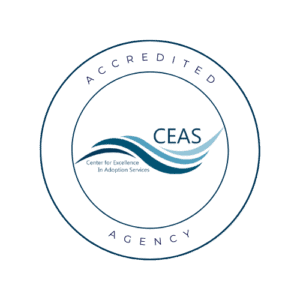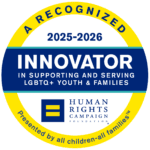It is with deep sadness that Spence-Chapin announces the passing of former Executive Director Jane Edwards. Mrs. Edwards received her Masters in Social Work in 1947 and was employed at Spence-Chapin from March 1, 1956 to January 12, 1990, serving as the Executive Director from 1968-1990. Under Edwards’ leadership, Spence-Chapin services expanded to serve the most vulnerable children in New York and around the world. Jane Edwards steered Spence-Chapin through changing social norms and adoption practices in the mid-twentieth century.
Early in her career at Spence-Chapin, Jane Edwards contributed to advocating for African-American adoptions. Due in part to Ms. Edwards’ commitment, in the late 1950s and 1960s, Spence-Chapin focused on finding adoptive parents and community resources for African-American babies languishing at Harlem Hospital. Rachel Robinson, wife of baseball player Jackie Robinson, joined the Spence-Chapin Board of Directors in 1953. As the movement gained momentum, more illustrious Americans, including Ruth Harris (wife of political scientist and Noble Peace Prize winner Ralph Bunche), Marian Anderson (celebrated American singer), and Willetta S. Mickey (wife of Civil Rights pioneer Hubert Delaney) helped Spence-Chapin recruit African-American adoptive families. Eleanor Roosevelt was the featured speaker at a Spence-Chapin conference in 1954, saying, “No matter what the color of their skin, all our children must be looked at as the future rich heritage of the country.”
Spence-Chapin’s advocacy in the 1950s had a lasting influence on Jane Edwards. Recognizing the need for increased social services for young mothers in Harlem, As Executive Director, Jane Edwards partnered with then Board President, Alice Hall Dowling, to form the Harlem Dowling Project in 1969. The Project’s adoption and social services assisted young mothers in Central Harlem who were unable to care for their newborn babies. The Project has become a fully independent organization with a focus on serving parents and children in foster care as the Harlem Dowling-West Side Center for Children & Family Services.
As a pioneer in adoption services, Jane Edwards moved Spence-Chapin’s services to include foster care and international adoption. In 1975, Spence-Chapin began its first international adoption program placing children from South Korea with American adoptive families. This international adoption program began through a request of the American Korean Foundation to find families for children. Over the next few decades, Spence-Chapin would open additional international adoption programs and thousands of children born abroad would find permanency through Spence-Chapin’s international adoption services.
In 1975, the organization’s name changed from Spence-Chapin Adoption Services to Spence-Chapin Services to Families and Children to reflect the agency’s involvement in foster care and preventative services. According to a New York Times article published in 1985, during Mrs. Edwards’s leadership, Spence-Chapin had five city contracts for programs such as adoption, mental health and preventive services, and foster care; serving more than 1,000 people a month. Through her focus on foster care and international adoption, Jane Edwards expanded Spence-Chapin’s scope of work to include advocacy and adoption services for the most vulnerable children in New York and around the world.
Throughout Mrs. Edwards’s career at Spence-Chapin she was an advocate for domestic and international adoption and promoted Spence-Chapin’s adoption services throughout New York City. In 2003 the first Spence-Chapin Awards for Excellence in Adoption was presented to Jane D. Edwards and Gladys Randolph for their service to children and families. Jane Edwards is remembered fondly by her former co-workers and by professionals in the adoption field for her dedication and passion for serving the adoption community.





